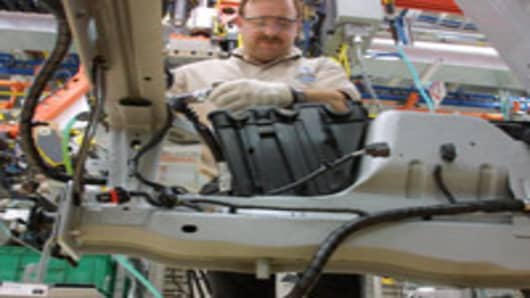Both General Motors and Chrysler have announced plans to dramatically reduce their networks of thousands of dealers, saying that the moves are needed to cut costs as part of their restructuring efforts.
But the dealers argue that they don't cost the automakers much of anything — in fact, they make money for the companies, they say — and that the termination of the nearly 2,000 franchises between the two automakers could result in the shuttering of many of the businesses and the elimination of thousands of jobs.
Also, if the dealers are forced to close, cities around the country could be left with empty buildings, vacant lots and possibly hundreds of thousands of dollars in lost tax revenues.
All of which begs the questions: Just how much do dealerships actually cost their respective automakers? And what other incentives do the companies have to pare back their dealer bases?
Here are some questions and answers about why the automakers are ending their franchise agreements with so many dealers.
Q:What exactly are Chrysler and GM doing?
As part of its Chapter 11 proceedings, Auburn Hills, Mich.-based Chrysler released a list of the 789 dealers for which it plans to terminate franchise agreements.
The affected dealers, which account for about 25 percent of the company's dealer base, have until Tuesday to sell off their inventory. After that, they won't be able to offer Chrysler-sponsored financing and other sales incentives, making it tough for them to compete with
other dealerships without dramatically slashing their prices.
The move still needs the approval of the judge overseeing Chrysler's bankruptcy case, which could also come on Tuesday.
Meanwhile, Detroit-based GM plans to drop about 1,100, or 20 percent, of its dealers when their contracts end late next year, but the automaker has declined to reveal which automakers were chosen.
The move is part of GM's plan to cut about 40 percent of its 6,000-dealer network by the end of 2010. Besides the 1,110 dealership cuts, the company will shed about 500 dealerships that market the Saturn and Hummer brands, which the company has reached deals to sell,
along with the Saab brand, which GM also plans to phase out or sell.
And when the surviving dealers' contracts are up in late 2010, GM will cut still more by not offering renewals to about 10 percent of the dealers that are left.
Q: What's keeping the automakers from just closing the dealerships immediately?
Contrary to what a lot of people think, GM and Chrysler don't own the dealerships that sell their cars and trucks. The dealerships are franchises owned by independent companies or business people who sign a contract with an automaker to market their vehicles.
The dealers pay for the vehicles up front with a loan from either an automaker financing arm or an independent bank. Dealers also pay for things like local advertising, along with tooling and parts for their repair shops.
Normally, dealers are protected by strict state franchise laws that make it tough for automakers to terminate franchise agreements without showing significant cause.
Q: Why is it so important for the automakers to cut dealers?
Both Chrysler and GM claim that having such a large dealer base results in extra costs for them that they need to cut in order to be competitive in today's global automotive market.
Robert Nardelli, Chrysler's outgoing chief executive, testified during a bankruptcy court hearing late last month that the dealers represent "a host of expenses" for Chrysler related to things such as service training, advertising and sales incentives.
But when asked to quantify how much those things cost the automaker, Nardelli said he could not and wasn't sure if the automaker had determined those exact costs.
Both automakers also have argued that they need healthy dealer bases in order to be successful. Chrysler has said that most of the dealers it wants to eliminate are either unprofitable, don't carry all three brands of Chrysler vehicles, or are located too close to another Chrysler dealer.
Given the steep drop in U.S. new vehicle demand in the past year, along with the increase in competition from overseas automakers, there just are too few sales to go around, the automakers say.
And if dealers are struggling to stay afloat, they can't afford to make needed investments in their dealerships or provide the kind of service customers demand, which could reflect badly on an automaker and make it harder for the company to compete against its rivals, the automakers say.
While the dealers agree that's true, they say market forces and individual decisions by dealers should be allowed to dictate who goes out of business.
Q: Is there anything the dealers can do to fight this?
A group representing about 300 of the affected Chrysler dealers, along with several individual dealers, have filed objections to the automaker's plan in bankruptcy court.
A hearing on Chrysler's motion to terminate the agreements began Thursday with testimony from about a dozen dealers slated to lose their franchises. It's expected to continue on Tuesday with arguments from both sides.
U.S. Judge Arthur Gonzalez is expected to rule in favor of Chrysler. The judge noted at the beginning of Thursday's hearing that the automaker has a "strong argument" for the termination of the franchises.
The GM dealers slated to lose their franchises have a few more options. The automaker announced its plans to terminate the franchises before it filed for Chapter 11 on June 1, but has said it doesn't plan to speed up the process now that it's operating under court oversight.
The GM dealers have the option of filing an internal appeal with the automaker or could fight their termination in court.
Q: Are all the dealers losing their franchises going to shut down?
No. Many of the affected dealers plan to stay open selling used cars and operating their body shops. Some of them also carry other automaker brands that aren't affected by the decisions of Chrysler and GM.
But many dealers have also said that they can't stay in business selling just used cars and will be forced to completely shut down. In addition, some cities prohibit dealers from selling used cars unless they sell new ones as well, forcing them to close those operations too.
The National Automobile Dealers Association, an industry group, says the GM and Chrysler cuts combined could wipe out 100,000 jobs.



